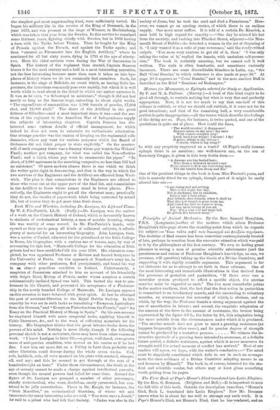Principles of Animal Mechanics. By the Rev. Samuel Hanghton, F.R.S.
(Longmans.)—One of the mottoes which adorn Professor Haughton's title-page shows the standing-point from which he regards his subject :—''EN1C1 reei.Pra p000 s' sic hp4OLIpyo; sal (1),X4oidu Iny4i2ern. The doctrine of final causes has been somewhat contemptuously treated of late, perhaps in reaction from the excessive attention which was paid to it by the philosophers of the last century. We own to feeling great pleasure in seeing a man of genuine scientific attainments (and the genuineness and extent of Professor Haughton's knowledge, no one, we presume, will question) taking up the thesis of a Divine Contriver, and supporting it with rigidly scientific argument. This argument is far too elaborate for us to attempt to set forth in these columns. One of the most interesting and remarkable illustrations is that derived from the processes of gestation and parturition, " If there ever was a muscular system produced to effect a specific object, the uterine muscles must be regarded as such." The two most remarkable points in the matter are these, first, the fact that the first action in parturition is committed to an involuntary muscle, and the succeeding to voluntary muscles, an arrangement the necessity of which, is obvious, and on which, by the way, the Professor founds a strong argument against the use of anesthetics in labour ; and second, the exquisite adaptation of the amount of the force to the amount of resistance, the former being represented by the figure 3.4 lb., the latter by 3.1, this adaptation being the more notable from the circumstances under which it is produced. " The uterine muscle does not grow to meet a growing resistance (as happens frequently in other cases), and its precise degree of strength cannot be produced by a tentative process We witness the in- structive spectacle of a growing force intended to overcome, at a definite future period, a definite resistance, against which it never measures its strength until the actual moment of conflict has arrived." Most of our readers will agree, we hope, with the writer's conclusion :—" The mind must be singularly constituted which fails to see in such an arrange- ment the clear evidence of a Divine Contriver adapting means to an end foreseen by Himself." The book is, of course, intended for the stu- dent and scientific reader, but others may at least glean something worth getting from its pages.






































 Previous page
Previous page